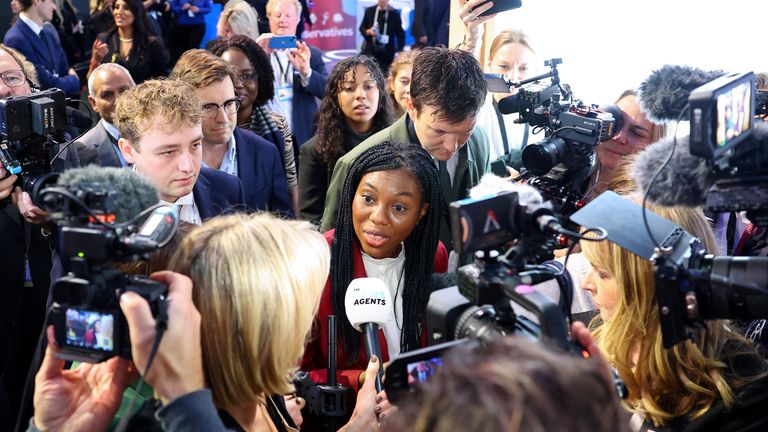It's Tory party conference, but not as you've come to know it.
This year the Tories are out of power and instead of trying to pitch a vision to the country, conference is consumed with the search for a new leader.
Politics Live: Badenoch praises Israel for 'amazing thing with the pagers' in Lebanon
This last happened after the 2005 general election as David Davis and David Cameron battled it out for the top job and it makes for curious viewing.
There is a lack of coherence and clear message. Instead we are watching a beauty parade of the four contenders all vying to attract a small selectorate. It means the big issues facing the country - the economy, the NHS, migration - are being, in the main, drowned out as discussions over the issues that matter more to Conservative Party card carriers take the main stage.
At his breakfast rally on Monday, leadership hopeful and current frontrunner with MPs Robert Jenrick spoke almost entirely about the need for the UK to exit the European Convention on Human Rights (ECHR), warning that it was "leave or die for our party".
When I pressed him about his remarks and whether it was rather excessive to say the Conservative Party faced extinction if it didn't leave the ECHR, he replied: "I think a party of the centre right has to have an answer to these issues.
"And if we don't take a stand on fixing illegal migration, restoring sovereignty to our people in our parliament, that isn't a future for the Conservative Party."
Meanwhile, his closest rival Kemi Badenoch has kicked off her conference with controversy over remarks she made around maternity pay and her assertion that "not all cultures are equally valid when it comes to decided who should be allowed into the UK".
Be it the European Convention on Human Rights, or remarks that spark talk of "culture wars", it is not, perhaps, top of the wider public agenda.
But this conference is nothing to do with you watching from home, this part of the Conservative leadership election is all about the members.
"They obsess about this stuff," explains one current Conservative MP. "Look at what Keir Starmer did in 2020 appealing to the left, or Ed Miliband did in 2010 when he used the unions to edge past his brother in the leadership race. They understood you have to talk to your selectorate."
But after the worst election defeat in modern history, there are others here frustrated that the party is looking inwards, worried that the response to the 2024 Labour landslide could mimic that of 1997 when the Conservatives chose a leader that appealed to the party but had no reach beyond.
Among the 121 MPs left, there is a very live discussion over the direction to take, with many MPs wanting to rebuild with a more "profound" debate around the principles of "Conservatism" and the role of the state in our lives, and others wanting the party to focus relentlessly on the priorities of the public and come up with a programme that might woo some voters back.

Sir Robert Buckland, the former cabinet minister who lost his seat in the last general election, told me on the fringes of this conference: "I'm not hearing enough about the issues that matter to the British people whether it's the cost of living, the future of our environment and the security of Britain in an increasingly uneasy world."
He also said going on about the ECHR "is weird".
"That's not where the public are. They're not sitting in the Dog and Duck and worrying about Article 14 of ECHR.
"We could talk about that for hours.
"I was lord chancellor and I've been a lawyer for 30 years. These issues are not relevant either to immigration or indeed to the general welfare of the British people, which is what the Conservative Party at its best has been all about. Get real, stop being weird and actually address the priorities of the British people."
But that isn't what the next few days are about.
This beauty parade is all about the party, rebuilding with the public will have to wait.
And the question for those of us watching who aren't card-carrying members of the Conservative Party is whether the person they pick can pivot from attracting this niche electorate to a much wider audience.
It is that, rather than membership of the ECHR, that will determine whether the party faces an existential crisis or not.
Disclaimer: The copyright of this article belongs to the original author. Reposting this article is solely for the purpose of information dissemination and does not constitute any investment advice. If there is any infringement, please contact us immediately. We will make corrections or deletions as necessary. Thank you.



